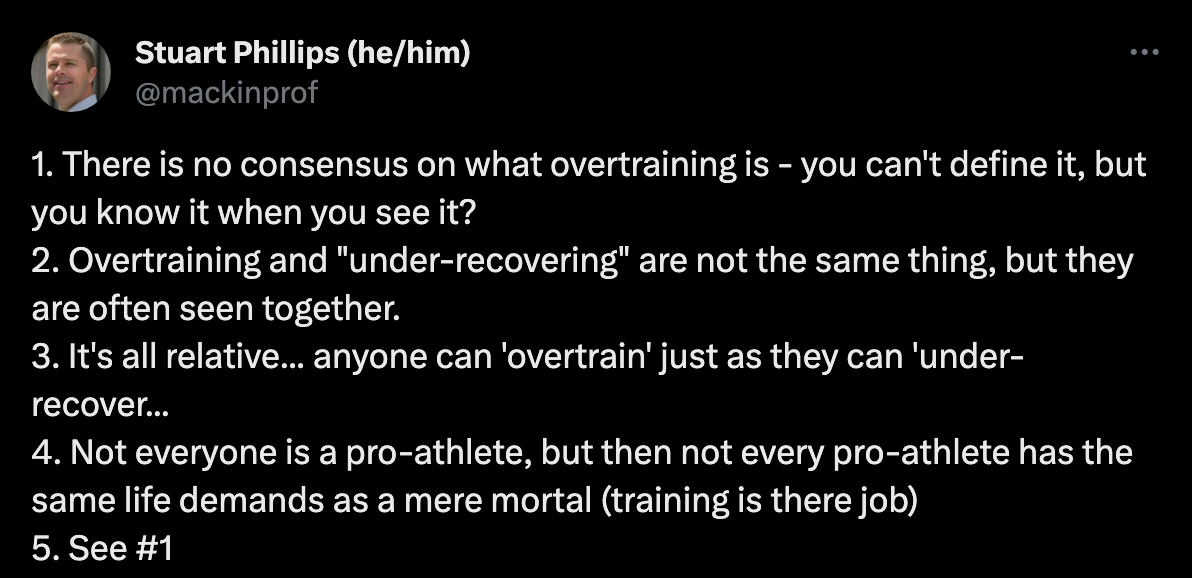Why Your Relativistic Definition of Overtraining is Stupid
How Relativistic Definitions of "Overtraining" Make the Term Useless & Redundant
Lately on Twitter/X, I’ve been digging into the topic of overtraining which has opened the floodgates of discussion and disagreement.
“Unless you’re a pro athlete, the risk of ‘overtraining’ is next to zero.” - Me (2023)
This tweet did numbers, getting over 60K views and spurring a number of debates in my mentions. One of the debates being at the center of today’s newsletter, is “overtraining all relative?”
First, why should you care about this topic?
Depending on the definition you use for “overtraining” you can either be left confused or enlightened on how much volume is too much volume, and what to do about it. You may be surprised to learn the implications of asking the right questions while using useful definitions.
Defining “Overtraining”
Let’s come up with a charitable working definition of what the general public might understand to be “overtraining.”
The status of a trainee whose volume of work in the gym is higher than their ability to recover, resulting in a decrease in performance lasting more than 2-3 weeks.
While this may seem to be an unobjectionable definition, it leaves some room for interpretation.
“It’s all relative…”
Stuart claims that it’s all relative, meaning that whatever your recovery status is overtraining can occurs. Again, seems unobjectionable, but if we observe the implications of this a bit more closely, we realize that we’ve now eliminated all use of the term “overtrain” altogether.
We have already a definition for fatigued and under-recovered. What new information does “overtrain” offer us if we don’t take into account the recovery status of the trainee?
The only useful definition for "overtrained," is one in which we hold for maximum recoverability. This allows us to determine the upper-threshold of the amount of work the average gym-goer can do and recover from.
Using this definition we actually get to make inquiries which offer us valuable insight into what is possible at the upper limits of recovery. Based on the literature, we find that, almost exclusively, those who train at the level of professional athletes, are the only population that is shown to be at risk of exceeding this “overtraining” threshold. In other words, their recovery strategies being perfect, are still not enough to account for the total volume of work they are doing in their training.
Do you see how one definition leaves us with a definition which is identical to “fatigued” and “under recovered?” Seeing as we already have definitions for these terms, I (along with many top exercise scientists) prefer using useful terminology which serves to further of our understanding of the relationship between volume, recovery, and training capacity -- not muddy it.
Applications and Takeaways
Does this mean that only professionals can overtrain? Of course not. Anyone who is training in the gym training 9-10 sessions per week at 2 hours a piece, are training at what some would consider a professional level and are very much at risk of overtraining.
Why this inquiry is useful in the first place, is that it gives us an idea of what is possible to recover from all thing being perfect. But we do not live in a perfect world. Many of us have kids and getting perfect sleep is out of the question. Some of us have to travel for work, and nutrition is never going to be easy. In these instances, should you just focus on better recovery? If you are experiencing the symptoms of overtraining and can’t dial in better recovery (because life happens), then lowering the volume is a your move.
This becomes a lot more straightforward when we allow ourselves a more absolute definition and not a relativistic one.




Overtraining syndrome (OTS) is very hard to define and is very relative for each athlete. Like medical syndromes - collections of symptoms that define a disease - https://en.wikipedia.org/wiki/List_of_syndromes - OTS would fall in this category. Here are the most recent IOC 'consensus' definitions of the syndrome: https://bjsm.bmj.com/content/50/17/1030 & https://bjsm.bmj.com/content/50/17/1043 but because it's relative and not absolute makes it neither useless nor 'stupid.' Still sitting at 52k followers ;-)